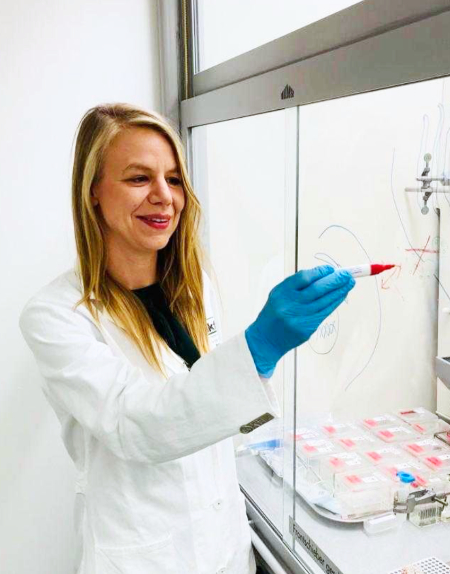(copy 3)
[Translate to En:](copy 1)
Early cancer diagnostics and reverse translation
Our team consists of members with a background in biology, biotechnology, bioinformatics or medicine. We are strongly involved in all three major programs of the Hopp Children’s Cancer Center. Preclinical, translational and clinical research is conducted in three closely interconnected focus areas outlined below. These aim at improvement of diagnostic accuracy and targetability of selected central nervous system tumors or sarcoma types and early cancer detection including in-depth molecular tumor analysis from body fluids (liquid biopsies). Through an intense cross-disciplinary strategy involving other KiTZ groups and our (inter)national collaboration partners, we often follow a bedside-to-bench approach (reverse translation) including modeling of tumor types and early adoption of innovative and powerful technologies. Our group is also part of the platform programs INFORM (relapsed/recurrent malignancies) and MSP2.0 (molecular sarcoma pathology) allowing for rapid validation and clinical translation.
A major focus of our group is on ependymal tumors. Having established a robust and reliable molecular classification scheme that was recently fully integrated into the WHO classification, we now seek for retro-/prospective validation and clinical application (GPOH HIT trials, SIOP Ependymoma II/BIOMECA). Molecular classification has enabled identification of novel tumor types and allows to analyze biologically homogenous groups for identification of oncogenic drivers or potential therapeutical targets. We have established various model systems that now aid in exploring oncogenic or functional genomic dependencies and developing novel treatments or diagnostic approaches. Blocking intercellular communication processes, targeting the stem cell niche through interfering with vesicular trafficking and radiation/drug screening approaches are currently a preclinical focus. Within an interdisciplinary approach (UNITE, SFB1389), we seek to better understand implications of blood brain barrier compositions in different brain tumor types, to implement alternative ways for more reliable predictions of tumor drug disposition (KI-based prediction and cerebral microdialysis) and to find novel paths of delivery to improve therapeutic approaches for pediatric brain tumors.
Even though phenotypically and genetically very heterogeneous, most sarcomas share a poor prognosis constituting a huge medical need for novel therapies. Immunotherapies have so far only demonstrated limited individual clinical successes. To turn adoptive T cell therapy into curative strategies, we are collaboratively assessing immune targets, immune evasion signatures and
multi-directional interactions of CAR-T cells with tumors and their microenvironment in a multi-layered approach (funded by DFG). Furthermore, to set optimal conditions for novel therapies, we harness the potential of non-invasive technologies for both early detection of sarcomas and monitoring of intratumoral heterogeneity within the HEROES-AYA consortium (funded by BMBF).
To further improve molecular diagnostics, treatment decisions and disease surveillance within personalized medicine approaches, we are leveraging tumor-derived genetic information circulating in plasma or cerebrospinal fluid (liquid biopsies). Having established and optimized liquid biopsy preanalytics, molecular analyses and specific bioinformatic tools, we are seeking to implement common liquid biopsy standards in pediatric oncology working together with our partners, e.g., within GPOH or SIOP-E. Clinical translation is realized in ongoing clinical trials (e.g., INFORM2, LOGGIC, PersoMed-1, SIOP EPN II) and diagnostic pipelines, INFORM, MSP2.0 and the LIQUIFY program. MSP2.0 is a novel and comprehensive molecular profiling platform of the Cooperative Weichteilsarkom Studiengruppe (CWS) that we are developing in collaboration with the Grünewald and Banito groups and additional partners. An additional focus of this research area is on cancer predisposition syndromes. Beside patient counseling, variant interpretation within diagnostic platforms and establishing surveillance recommendations in various consortia of the AACR, SIOP or GPOH, our group runs collaborative population-based predisposition sequencing (CPS-GCCR, funded by the German Childhood Cancer Foundation) and liquid biopsy-based screening approaches (ADDRESS, funded by BMBF).
1. Mack SC*, Pajtler KW*, Chavez L* et al., Therapeutic targeting of ependymoma as informed by oncogenic enhancer profiling. Nature. 2018 Jan 4;553(7686):101-105. doi: 10.1038/nature25169.
2. Hübner JM, Kool M, Pfister SM, Pajtler KW. Epidemiology, molecular classification and WHO grading of ependymoma. J Neurosurg Sci. 2017 Sep 8. doi: 10.23736/S0390-5616.17.04152-2.
3. Liu KW*, Pajtler KW*, Worst BC, Pfister SM, Wechsler-Reya RJ. Molecular mechanisms and
therapeutic targets in pediatric brain tumors. Sci Signal. 2017 Mar 14;10(470). pii: eaaf7593. doi: 10.1126/scisignal.aaf7593.
4. Kratz CP, Achatz MI, Brugières L, Frebourg T, Garber JE, Greer MC, Hansford JR, Janeway KA, Kohlmann WK, McGee R, Mullighan CG, Onel K, Pajtler KW, Pfister SM, Savage SA, Schiffman JD, Schneider KA, Strong LC, Evans DGR, Wasserman JD, Villani A, Malkin D. Cancer Screening Recommendations for Individuals with Li-Fraumeni Syndrome. Clin Cancer Res. 2017 Jun 1;23(11):e38-e45. doi: 10.1158/1078-0432.
5. Pajtler KW, Mack SC, Ramaswamy V, Smith CA, Witt H, Smith A, Hansford JR, von Hoff K, Wright KD, Hwang E, Frappaz D, Kanemura Y, Massimino M, Faure-Conter C, Modena P, Tabori U, Warren KE, Holland EC, Ichimura K, Giangaspero F, Castel D, von Deimling A, Kool M, Dirks PB, Grundy RG, Foreman NK, Gajjar A, Korshunov A, Finlay J, Gilbertson RJ, Ellison DW, Aldape KD, Merchant TE, Bouffet E, Pfister SM, Taylor MD. The current consensus on the clinical management of intracranial ependymoma and its distinct molecular variants. Acta Neuropathol. 2016 Nov 17.
- PD Dr. Kristian W. Pajtler, MBA (Groupleader)
- Dr. Kendra K. Maass (Deputy groupleader/Lab head)
- Paula Ertel (technician)
- Tom Fischer (MD student)
- Clara Gade (MD student)
- David Ghasemi, MRes (MD student)
- Sema Hamurcu (MD student)
- Sophie Henneken (MD student)
- Karla Catacora (PhD student)
- Johanna Rettenmeier (MD student)
- Paulina Schad (Physician scientist)
- Nathalie Schwarz (technician)
- Nike Simon (MD student)
- Julia Sundheimer (PhD student)
- Stefanie Volz, B.sc. (bioinformatician)
- Tatjana Wedig (leading technician)
- Tuyu Zheng, Ph.D. (PostDoc)

Postal address:
Hopp Children's Cancer Center Heidelberg
Im Neuenheimer Feld 580
D-69120 Heidelberg
Germany

